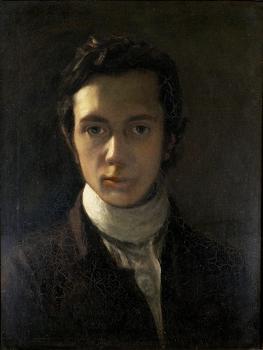
self portrait
from
"On the Midsummer Night's Dream" 1
Bottom the weaver is a character that has not had justice done him. He is the most romantic of mechanics. And what a list of companions he has—Quince the carpenter, Snug the joiner, Flute the bellows-mender, Snout the tinker, Starveling the tailor; and then, again, what a group of fairy attendants, Puck, Peaseblossom, Cobweb, Moth, and Mustard-seed! It has been observed that Shakspeare’s characters are constructed upon deep physiological principles; and there is something in this play which looks very like it. Bottom the weaver, who takes the lead of
‘This crew of patches, rude mechanicals,follows a sedentary trade, and he is accordingly represented as conceited, serious, and fantastical. He is ready to undertake any thing and every thing, as if it was as much a matter of course as the motion of his loom and shuttle. He is for playing the tyrant, the lover, the lady, the lion. ‘He will roar that it shall do any man’s heart good to hear him’; and this being objected to as improper, he still has a resource in his good opinion of himself, and ‘will roar you an ‘twere any nightingale.’ Snug the joiner is the moral man of the piece, who proceeds by measurement and discretion in all things. You see him with his rule and compasses in his hand. ‘Have you the lion’s part written? Pray you, if it be, give it me, for I am slow of study.’ ‘You may do it extempore,’ says Quince, ‘for it is nothing but roaring.’ Starveling the tailor keeps the peace, and objects to the lion and the drawn sword: ‘I believe we must leave the killing out, when all’s done.’ Starveling, however, does not start the objections himself, but seconds them when made by others, as if he had not spirit to express his fears without encouragement. It is too much to suppose all this intentional: but it very luckily falls out so. Nature includes all that is implied in the most subtle and analytical distinctions; and the same distinctions will be found in Shakspeare. Bottom, who is not only chief actor, but stage-manager for the occasion, has a device to obviate the danger of frightening the ladies: ‘Write me a prologue, and let the prologue seem to say, we will do him no harm with our swords, and that Pyramus is not killed indeed; and for better assurance, tell them that I, Pyramus, am not Pyramus, but Bottom the weaver; this will put them out of fear.’ Bottom seems to have understood the subject of dramatic illusion at least as well as any modern essayist. If our holiday mechanic rules the roast among his fellows, he is no less at home in his new character of an ass, ‘with amiable cheeks and fair large ears.’ He instinctively acquires a most learned taste, and grows fastidious in the choice of dried peas and bottled hay. He is quite familiar with his new attendants, and assigns them their parts with all due gravity. ‘Monsieur Cobweb, good Monsieur, get your weapon in your hand, and kill me a red-hipt humble bee on the top of a thistle, and good Monsieur, bring me the honey-bag.’ What an exact knowledge is shewn here of natural history!
That work for bread upon Athenian stalls,’